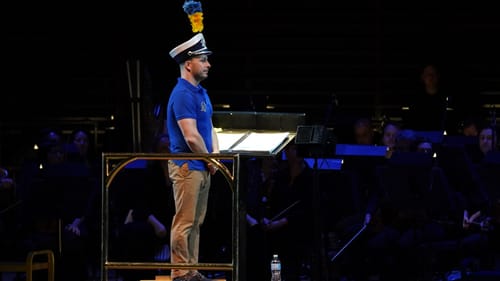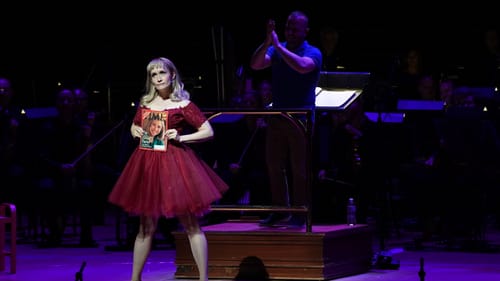Stay in the Loop
BSR publishes on a weekly schedule, with an email newsletter every Wednesday and Thursday morning. There’s no paywall, and subscribing is always free.
Seeking star power
The Philadelphia Orchestra presents ‘Candide’ with Bradley Cooper and Carey Mulligan

The Philadelphia Orchestra closes its 2018-2019 season, as well as its multiyear celebration of Leonard Bernstein’s centennial anniversary, with a semi-staged production of his 1956 operetta Candide, conducted by music director Yannick Nézet-Séguin. Yet I suspect the full-to-bursting crowd at Verizon Hall didn’t show up on opening night to worship at Lenny’s alter. They had another deity in their sights.
The boldface name in question is Bradley Cooper, who serves as narrator of these performances alongside Oscar nominee Carey Mulligan. The Jenkintown native is slated to script and star in a biopic of the legendary composer/conductor, with Mulligan cast in the role of Bernstein’s wife, Felicia Montealegre. In business-speak, the appearance generated great synergy—especially at the box office, where single tickets commanded upwards of $300.
Superfluous stars?
Cooper had only to walk onstage and smile to make a large segment of the audience happy. In this critic’s opinion, he offered little more than that in the way of interpretation. His eyes remained glued to a script throughout the performance, and he inflected line readings with minimal humor or gravitas. Surefire laugh lines fell surprisingly flat. It was an unfortunate case of a star failing to deliver any real star power.
For her part, Mulligan proved more lively—her dry English delivery brought out the comedy in Hugh Wheeler’s libretto (presented here in an adaptation by Lonny Price). But overall, the presence of both seemed superfluous. They added little to the evening in total and occasionally pulled focus away from the real reason for mounting these concerts.
That reason, of course, is to allow the orchestra to step outside its comfort zone—and to allow Nézet-Séguin, an experienced opera conductor, the chance to bring some of that magic to his home turf. Candide can be a frustratingly uneven enterprise, but it contains some of the greatest light classical music ever written for the American stage. The Philadelphians honored that with a reading of the score that combined the nimbleness of a pops orchestra and the necessary heft to bring Bernstein’s serious classical allusions to the fore. I doubt I’ll hear the legendary overture performed better anytime soon.

‘90s kids
Dramatic matters don’t always cohere so well. Stage director Kevin Newbury sets the scene in an early-‘90s secondary school—the province of Westphalia becomes Westphalia High. Sets and costumes (by Andrew Boyce and Paul Carey, respectively) trade on memories of Saved by the Bell and 90210, with big hair, snapping gum, grungy flannels, and rows of identical lockers. There’s no denying how much it smells like teen spirit.
Newbury fits the action of the story into this frame. War becomes a football game. Crossing the ocean? The Oregon Trail, natch. The concept is not without a few clever touches—like transforming the saucy maid Paquette (Amanda Lynn Bottoms, an excellent Curtis student) into a goth girl—and as a confirmed nineties kid, I was amused. As an opera critic, I came away with more reservations.
At best, the general idea wears out its welcome long before the final resolution. At worst, it creates a series of cringeworthy tableaux. Newbury doesn’t fully consider the implications of setting a tale rife with gratuitous rape and murder inside the world of high school. It’s a prospect that requires extreme care and taste under any circumstances, but especially now, in the wake of #MeToo and a constant barrage of school shootings. Further ill-judged moments abound, including juxtaposing the Old Lady’s narrative of woe with footage of the Rodney King beating or associating a sex-ed class with fatalistic AIDS images.
The best of all
Vocal performances of a very high order compensated for directorial issues in many cases. Soprano Erin Morley, who proved an excellent recitalist with the Philadelphia Chamber Music Society earlier this season, turned in an even more impressive performance here. There was never any doubt she could deliver the stunning Cs and E-flats of Cunegonde’s showpiece aria “Glitter and Be Gay”—and she added what sounded to these ears like a high A-flat. But her interpretation of the tricky character—who vacillates between vapidity and surprising intelligence—has deepened and expanded since I first saw her play the part at Carnegie Hall last year.

Decked out in a garish warmup suit, veteran mezzo-soprano Denyce Graves has a ball as the Old Lady, though her voice sounded less steady than in years past. No such problem for tenor William Burden, who turned the relatively small role of the Governor into a momentary showstopper. He possesses one of the most beautiful tenor voices of the last quarter-century—and one seemingly untouched by time, to the point where he could still believably sing Candide.
At times I wished he would. In the title role, tenor Alek Shrader proved the only real disappointment, his tone sounding pale and thin throughout the evening. He counterbalanced this with a finely judged, often funny interpretation of the role, but I came away wishing for an extra dash of heroic heft in the singing.
Through it all, the orchestra continually delivered—so much so that during the curtain call, Nézet-Séguin and the cast bowed to them. It seemed appropriate. To borrow a line from the musical, they are the best of all possible orchestras, in the best of all possible cities, in the best of all possible worlds.
What, When, Where
Candide. By Leonard Bernstein and Hugh Wheeler. Conducted by Yannick Nézet-Séguin. Directed by Kevin Newbury. Philadelphia Orchestra. June 20-22, 2019, at the Kimmel Center’s Verizon Hall, 300 S. Broad Street, Philadelphia. (215) 893-1999 or philorch.org.
The Kimmel Center is an ADA-accessible venue. Patrons can purchase wheelchair seating or loose chairs online, by calling Patron Services at (215) 893-1999, or by emailing [email protected].
Sign up for our newsletter
All of the week's new articles, all in one place. Sign up for the free weekly BSR newsletters, and don't miss a conversation.

 Cameron Kelsall
Cameron Kelsall